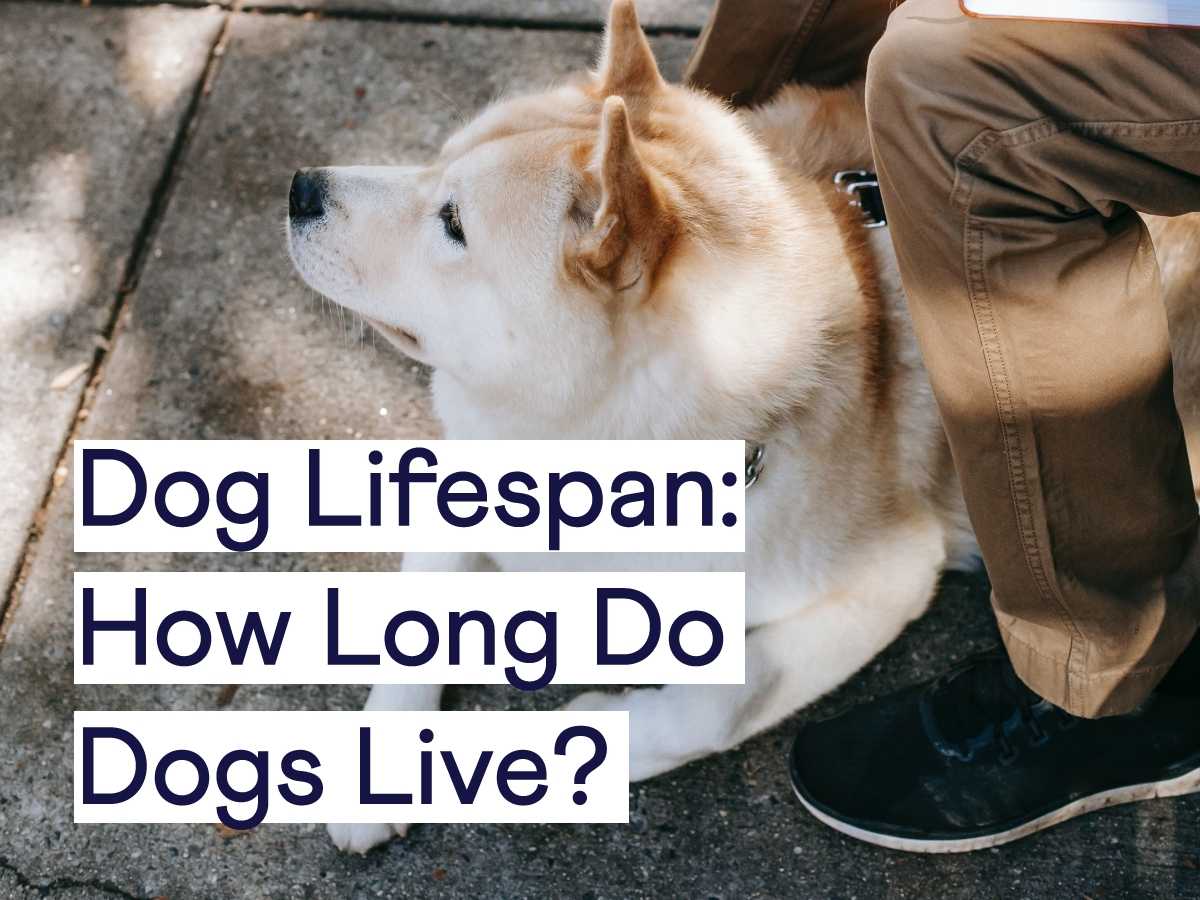
Dog Lifespan: How Long Do Dogs Live?
What is the average dog lifespan, and what can you expect as your pet ages? Finn has a primer on the canine aging process and what you need to know.
As much as we don’t want to admit it, our dogs aren’t immortals. That’s why it is essential to help them live their best lives for the years we are lucky enough to have them. Embracing your dog’s aging process and helping them enjoy each stage of their life is one way to do this.
Understanding the average dog's lifespan can guide you toward ways to increase their quality of life. Finn has more on everything you need to know about what to expect but may have been too afraid to ask.
The Dog Lifespan Varies, a Lot
If there was a way to scan your dog and find out exactly how long they’re going to live, would you want to? Unfortunately (or fortunately, depending on how you feel), that science hasn’t been developed yet.
However, we can look at the average lifespan of the different dog breeds scientists have studied and use that data to make basic assumptions.
It’s believed the average dog lifespan is between 10 - 13 years. One of the main factors affecting which side of that scale a dog falls on is its breed. Larger breed dogs tend to live for a shorter time, while smaller dogs end up living much longer. Outliers are also possible, like giant breed dogs (around eight years, average) and toy breed dogs (up to 16 years). These averages are based on purebred dogs, as well. We’ll discuss mixed breeds in a moment.

To help you conceptualize that better, here are some of the most common breeds and their accepted average lifespan. We start with toy and small breeds and move up in size:
- Chihuahua: 15 - 17 years
- Jack Russell Terrier: 13 - 15 years
- Pomeranian: 14 - 16 years
- Yorkshire Terrier: 12 - 15 years
- Boxer: 10 - 12 years
- Bulldog: 10 - 12 years
- French Bulldog: 11 - 13 years
- Poodle: 12 - 15 years
- Bernese Mountain Dog: 7 - 10 years
- Great Dane: 8 - 10 years
- Golden Retriever: 8 - 12 years
- Rottweiler: 10 - 12 years
What Are the Longest Living Dog Breeds?
The longest living dog breeds conversation revolves almost exclusively around the toy and small breed dogs. The short end of the average lifespan of a chihuahua starts at 15, for instance. Other small breed dogs have just as much longevity, including the Jack Russell Terrier, Maltese, Pomeranian, Shih Tsu, and Yorkshire Terrier.
Don’t count out a medium-breed dog, though! Certain medium-breeds can also generally live long lives. In fact, the title of the official “longest living” dog goes to an Australian Cattle Dog from Australia. Shiba Inus can have also have a long lifespan, with an average life expectancy of around 15 years.
How Long Do Mixed Breed Dogs Live?
So much of what we know about the average dog breed lifespan comes from studying purebred dogs. But what if you, like so many other people across the United States, are the proud owner of a mixed breed dog?
While there isn’t an exact science to it, you can make some basic assumptions about the average dog lifespan of your precious pet by taking their weight into account.
Generally speaking, dogs that weigh in at under 20 pounds live an average of 11 years, as do most medium to large-sized dogs (under 90 pounds). However, giant breed dogs (over 90 pounds) live an average of 8 years. That average continues to increase as the years go on, likely due to a focus on better, more efficient veterinary care.
If you have done a genetic test or know the breeds your mixed-breed dog has likely come from, that can also help you make an educated guess about their longevity.
How Do Dog Years Work?
Most people have heard of the concept of measuring not in human years but in dog years. The general idea is that a single dog year is equivalent to seven human years. Unfortunately, that isn’t a fact that is supported by science. It seems to be founded on the average dog lifespan years ago compared to ours, which ended up with a ratio of 7:1 (with humans averaging about 70 years, and dogs just 10). The concept of dog years was likely a marketing campaign instead of real, hard science.
The AVMA (American Veterinary Medical Association) has a more scientific calculation based on the average medium-sized dog.
What they’ve come up with is that the first year of a dog’s life is equal to 15 of ours (think: infant through early teens). Their second year is equivalent to nine additional human years (taking them to their early 20s). After that, each year of their life is about five human years.
While it isn’t as straightforward as the idea of “dog years,” it does help to explain how they age both physically and mentally.
But do dog years matter when it comes to figuring out the average dog lifespan? The answer is yes, in a way.
Think about it this way — if we are seniors when we hit 65 to 70 years of age, the typical small breed dog will reach that title at about 12 or 13. On the other hand, a giant breed dog would only be 8 or 9. That guide can help you understand when your dog may have advanced into the “senior” phase of their lives, which requires more care, understanding, and specific, supportive care to keep them as healthy, happy, and comfortable as they can be.
And remember, just because your dog is a senior doesn’t mean that you have to prepare for the worst! Elderly dogs can live just as happy and healthy lives and, even if they do develop age-related issues (like urinary incontinence, arthritis, or hip pain), it doesn’t have to be the end of the road.
Thanks to modern veterinary science, more interventions than ever can help keep them comfortable even in their advanced age. The key is setting your dog up with a healthy foundation and identifying problems quickly when they do occur.
Are There Ways To Extend the Average Dog Lifespan?
Now, to what you want to know! While no amount of time lets us spend enough of it with our precious pets, that doesn’t mean that we can’t find ways to keep them with us for as long as possible.
The number one factor you control as a pet owner is your dog’s nutrition. Remember, there is no one-size-fits-all diet. Different breeds, sizes, ages, etc., all require a slightly different, customized nutritional formulations. Choosing a quality food that fits your dog’s unique needs is something you should consider even as a puppy.
Giant breed dogs, for instance, need their diet to help control their growth rate, which helps reduce their risk of developing hip dysplasia. A proper diet can also help keep your dog at a healthy weight, which is essential as obesity in dogs can lead to many other health conditions that can shorten their lives.
Supplements can help support your dog, too. If you’re unsure where to start, try our free consultation quiz here or get in touch with your vet.
Exercise is crucial to keeping your dog both mentally and physically healthy, but only if you’re doing it the right way. Don’t push your dog too far, but make sure they get some sort of activity every day.
As younger dogs, consider taking them for a long hike or run. As they age, try to find types of exercise that still keep them active without being too hard on their joints. Hydrotherapy and swimming are excellent options for older dogs. Remember, the older your dog is, the longer they will take to recover between activities.
Regular veterinary appointments are also non-negotiable for keeping your dog around as long as possible. Your veterinarian is your best resource to extend your dog's longevity and quality of life, whether to make sure they get the necessary vaccines, have routine bloodwork done, or just check them over for lumps and bumps.
As your dog ages, they can also recommend other ways to keep them comfortable and be there if any emergency arises.
To Summarize
Dogs are pure love, and we are lucky to be able to get to spend the time that we do with them. When you know the average dog lifespan for your dog’s size and breed, you can make the best choices when taking care of them and make every year count.
It’s one way to return the favor for all the unconditional love they give us. After all, without them, where would we be?
At Finn, we understand and respect the love between an owner and their dog because we’re dog lovers too! Let us help you give your pet their best life — because they deserve it.
Explore more articles and guides at our blog here, or take a look at our supplements for pups here.
Sources:
Dog Breeds - Types Of Dogs | American Kennel Club (akc.org)
Oldest dog ever | Guinness World Records
Senior pets | American Veterinary Medical Association (avma.org)
Dog and Cat Foods - Management and Nutrition | Merck Veterinary Manual (merckvetmanual.com)








Comments: